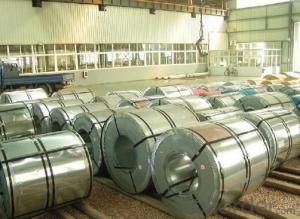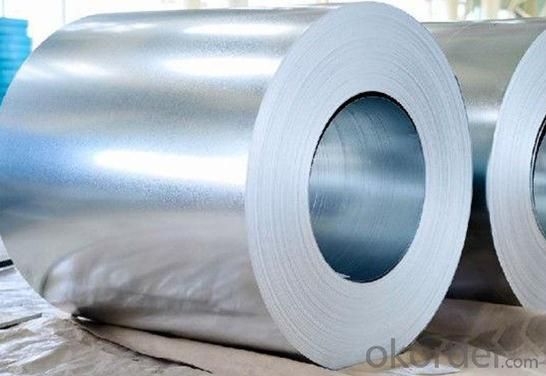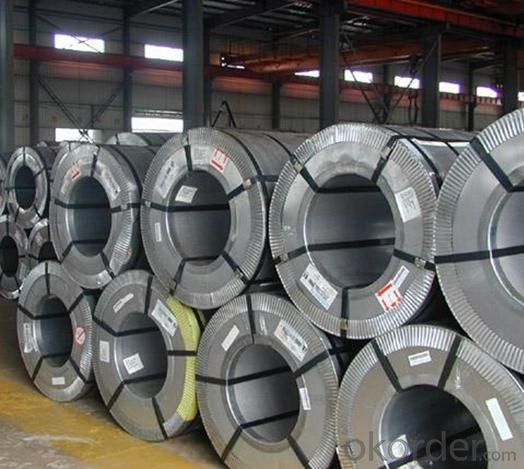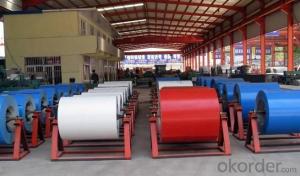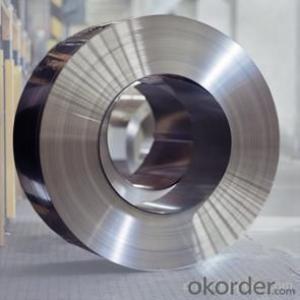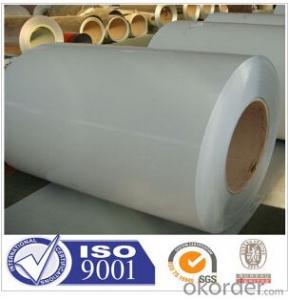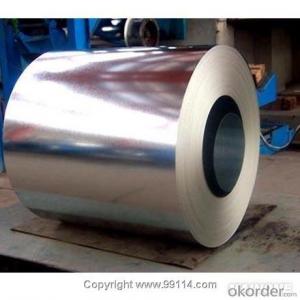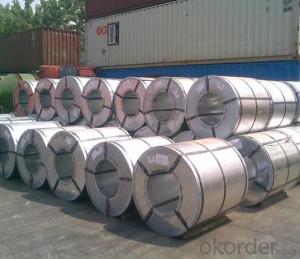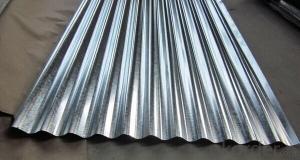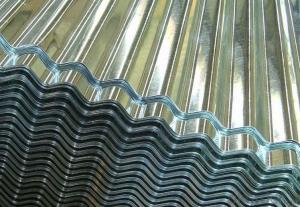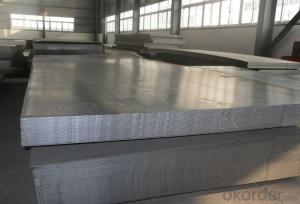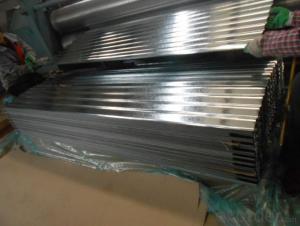Galvalume Steel for Corrugated Roofing Sheet- Hot Sale
- Loading Port:
- Tianjin
- Payment Terms:
- TT OR LC
- Min Order Qty:
- 25 m.t.
- Supply Capability:
- 5000 m.t./month
OKorder Service Pledge
OKorder Financial Service
You Might Also Like
1. Description of Galvalume Steel for Corrugated Roofing Sheet- Hot Sale Description:
Hot-dip aluzinc steel structure is composed of aluminum-zinc alloy, consisting of 55% aluminum, 43% zinc and 2% at 600 ℃ silicon solidification temperature and composition, the entire structure is made of aluminum - iron - silicon - zinc, to form a dense quaternary crystals an alloy.
Hot-dip aluzinc steel has many excellent features: strong corrosion resistance, is three times the pure galvanized sheet; zinc surface with beautiful flowers, can be used as a building outside board.
Applications of hot-dip aluzinc steel:
1)Building: roof, walls, garages, soundproof walls, pipes and modular housing.
2)Automotive: muffler, exhaust pipes, wiper accessories, fuel tank, truck boxes, etc.
3)Appliances: refrigerator back, gas stove, air conditioners, microwave oven, LCD frame, 4)CRT-proof band, LED backlight, electrical cabinets, etc.
5)Farm: barn, sheds, silos, piping and other greenhouse.
6)Other: breaking heat insulation cover, heat exchangers, dryers, warm water, etc.
2.Main Features of the Galvalume Steel for Corrugated Roofing Sheet- Hot Sale:
• Excellent corrosion resistance
• High temperature oxidation resistance
• High hot reflectance
• Good manufacturability
•Beautiful appearance
•Surface coating
•Cost-effective
3. Galvalume Steel for Corrugated Roofing Sheet- Hot Sale Images
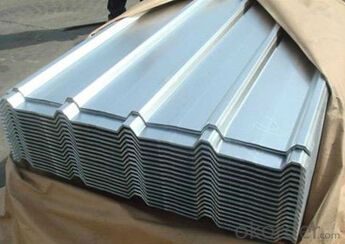
4. Galvalume Steel for Corrugated Roofing Sheet- Hot Sale Specification
AVAILABLE SPECIFICATION
HOT-DIP ALUZINC STEEL COILS | |
THICKNESS | 0.16mm-3.5mm |
WIDTH | 1250mm MAX |
COATING MASS | 30g/ m2-185 g/ m2 |
SPANGLE | Regular Spangle, Minimized Spangle, Zero Spangle |
SURFACE TREATMENT | Chromated / non-chromated, Oiled / non-oiled, Anti Finger Print |
COIL INNER DIAMETER | 508mm or 610mm |
HOT-DIP ALUZINC STEEL COILS | |||
COMMERCIAL QUALITY | ASTM A792M-06a | EN10327-2004 | JIS G 3321:2010 |
STRUCTURE STEEL | SS GRADE 230 SS GRADE 255 SS GRADE 275 SS GRADE 340 SS GRADE 550 | S220GD+AZ S250GD+AZ S280GD+AZ S320GD+AZ S350GD+AZ S550GD+AZ | SGLC400 SGLC440 SGLC490 SGLC570 |
5.FAQ of Galvalume Steel for Corrugated Roofing Sheet- Hot Sale
We have organized several common questions for our clients,may help you sincerely:
1.What advantages does your company have?
Cement : Annual capacity of 400 million tons, No. 1 in the world
Fiberglass: Annual capacity of 1 million tons fiberglass, No. 1 in the world.
Composite Materials — Carbon Fiber: Annual capacity of 10,000 tons PAN precursor and 4,000 tons carbon fiber, No. 1 in China
Composite Materials — Rotor Blade: Annual production capacity of 15,000 pieces, No.1 in China, Top3 worldwide
Glass: CNBM owns about 20 modern float glass product`ion lines, With annual capacity of 10 million square meters glass.
Light Weight Building Materials: Annual capacity of 1.65 billion square meters of gypsum board, No. 1 in the world.
Commercial concrete: Annual capacity of 0.35 billion cubic meters, No. 1 in the world.
Refractory Material: Annual capacity of 40,000 tons casting refractory, No.1 in the world.
2.What advantages do your products have?
Firstly, our base material is of high quality, Their performance is in smooth and flat surface,no edge wave ,good flexibility.
Secondly, high quality zinc ingoats, 97.5% zinc,1.5% silicon,1% others, the same zinc coating measured by metal coating thickness or by zinc weight
Thirdly, high precision: Tolerance strictly according to ASTM or JISG standard even more rigid.
We have full stes of testing equipment(for t best, cupule,chromatism,salt spray resistance, etc) and professional engineers.
3.Could you let me approach about your company in Dubai?
Located at Jebel Ali Free Zone in Dubai, CNBM Dubai Logistics Complex is adjacent to -Jebel Ali sea port-the largest port in UAE and Al Maktoum Airport-the largest airport in the world, which covers an area of 50,000 square meters, including an fully enclosed warehouse by 10,000 square meters, an open yard by 25000 square meters, and 13 standard unloading platform. CNBM Dubai Logistics Complex formally put into operation on August 1, 2013. Dubai Logistics Complex will commit itself to build the most professional and most influential building materials distribution center of China’s building materials industry in the UAE and throughout the Middle East and Africa.
- Q: What are the different types of coil leveling machines?
- There exists a variety of coil leveling machines utilized in different industries. Some frequently encountered types are as follows: 1. Precision Roll Levelers exhibit exceptional accuracy and possess the capability to precisely level coils. Employing a series of rolls, these machines apply pressure to eliminate any distortions or imperfections in the coil. 2. Straighteners are utilized to flatten coils that have become curved or warped during the manufacturing process. Typically, they consist of a set of rollers that gradually bend the coil in the opposite direction to restore its flatness. 3. Rotary Levelers are employed to level thicker coils or those with a higher yield strength. These machines employ a series of rolls that rotate in opposite directions, exerting pressure to flatten the coil. 4. Tension Levelers are commonly used to level thin-gauge coils. They function by applying tension to the coil while passing it through a series of rollers. This process effectively removes any waviness or unevenness in the coil. 5. Stretch Levelers are specifically designed for leveling coils made of high-strength materials. These machines employ a combination of stretching and bending to eliminate any irregularities on the coil's surface. 6. Cut-to-Length Lines not only level the coil but also cut it into specific lengths according to the customer's requirements. These machines are commonly utilized in precision-demanding industries like automotive or construction. In conclusion, the choice of coil leveling machine depends on factors such as the type and thickness of the coil, desired level of accuracy, and the intended application of the leveled coil.
- Q: What is the role of steel coils in the production of storage shelves?
- Steel coils are used in the production of storage shelves to provide strength and durability. The coils are processed and shaped into various components of the shelf, such as the frame, shelves, and brackets. This ensures that the shelves are able to withstand heavy loads and maintain their structural integrity over time. Steel coils also offer corrosion resistance, making them suitable for use in storage environments.
- Q: What are the different types of steel coatings used on coils?
- There are several types of steel coatings used on coils, including galvanized coatings, galvannealed coatings, and organic coatings.
- Q: How many types of steel buildings are there?
- There are a number of designs which can be used to create different types of steel buildings as per the demands of the buyer or an investor. he various kinds of that can be constructed using steel are Homes, Hangars, Agriculture and Farm buildings for storage, Garages and Storage sheds, Open air sheds,, Barns, Arenas and stadiums, Automotive buildings with overhead doors and flexible framed openings, Religious buildings such as Churches and Temples, etc.
- Q: How do steel coils contribute to the manufacturing of construction materials?
- Steel coils contribute to the manufacturing of construction materials by providing a reliable and versatile raw material. These coils are typically made from high-quality steel and can be easily shaped, cut, and formed into various components such as beams, pipes, and sheets. The strength and durability of steel make it ideal for use in construction, ensuring the integrity and longevity of buildings and structures. Additionally, the consistent quality and availability of steel coils enable efficient and cost-effective production processes, making them an essential element in the manufacturing of construction materials.
- Q: How are steel coils processed for pickling or oiling?
- Steel coils are processed for pickling or oiling by first being cleaned and then passed through a series of chemical baths or mechanical processes to remove any impurities or scale on the surface. This is followed by rinsing and drying the coils, after which they can either be pickled in acid to remove oxides or coated with oil to prevent corrosion.
- Q: What are the different types of steel coil recoiling methods?
- There are several different types of steel coil recoiling methods, including slitting, cut-to-length, and multi-blanking.
- Q: How are steel coils processed for different levels of hardness?
- Steel coils can be processed to achieve different levels of hardness through a variety of methods. One common method is heat treatment, which involves heating the coils to a specific temperature and then rapidly cooling them to alter their microstructure and achieve the desired hardness. The process of heat treatment can include quenching, tempering, or annealing, depending on the desired hardness level. Quenching involves cooling the coils rapidly in a liquid medium such as water or oil to achieve a high hardness level. Tempering, on the other hand, involves reheating the coils to a lower temperature and then slowly cooling them to achieve a desired balance of hardness and toughness. Annealing is a process that involves heating the coils to a specific temperature and then slowly cooling them to relieve internal stresses and achieve a softer and more ductile material. Additionally, mechanical processes such as cold rolling or cold working can also be used to increase the hardness of steel coils. These processes involve subjecting the coils to compressive forces, which cause the material to deform and result in an increase in hardness. Overall, the processing of steel coils for different levels of hardness requires careful control of temperature, cooling rate, and mechanical forces to achieve the desired properties for specific applications.
- Q: What is the role of steel coils in the automotive industry?
- Steel coils play a crucial role in the automotive industry as they are used to manufacture various components and parts of vehicles, including body panels, frames, chassis, and suspension systems. The high strength and durability of steel make it an ideal material for ensuring structural integrity and safety in automobiles. Additionally, steel coils offer cost-effectiveness, versatility, and the ability to withstand extreme conditions, making them an essential component in the production of cars and trucks.
- Q: What are the trends and developments in the steel coil industry?
- Over the past few years, the steel coil industry has undergone various trends and developments. These changes have been influenced by different factors, including advancements in technology, shifts in supply and demand, and concerns for the environment. One notable trend in the steel coil industry is the increasing utilization of advanced technologies in production. Automation and robotics have revolutionized the manufacturing process of steel coils, resulting in improved efficiency and quality control. These technologies have also enabled the industry to meet the rising demand for customized steel coils by allowing faster and more precise production. Another trend in the industry is the move towards lightweight and high-strength steel coils. With the increasing need for fuel-efficient vehicles, manufacturers are seeking lighter materials that still possess strength and durability. Steel coil producers are developing innovative products, such as advanced high-strength steels and ultra-high-strength steels, that meet these requirements. These materials offer enhanced performance while reducing the weight of the final product. Concerns for the environment have also spurred developments in the steel coil industry. There is a growing demand for sustainable and eco-friendly steel coils, leading to the adoption of greener manufacturing processes. Steel coil manufacturers are increasingly incorporating recycled materials and implementing energy-efficient technologies to reduce carbon emissions and waste generation. Additionally, there is a focus on improving the recyclability of steel coils to minimize their environmental impact throughout their lifecycle. Furthermore, the steel coil industry is experiencing a shift in the dynamics of supply and demand. Emerging economies, particularly in Asia, are driving the demand for steel coils due to rapid industrialization and urbanization. As a result, there have been increased investments in production capacity in these regions. Conversely, developed economies are witnessing a trend towards consolidation and specialization, with some companies focusing on niche markets or specific applications for steel coils. Overall, the steel coil industry is undergoing significant transformations that are being driven by advancements in technology, changing demand patterns, and environmental concerns. These trends and developments are reshaping the industry, making it more efficient, sustainable, and adaptable to the evolving needs of the market.
Send your message to us
Galvalume Steel for Corrugated Roofing Sheet- Hot Sale
- Loading Port:
- Tianjin
- Payment Terms:
- TT OR LC
- Min Order Qty:
- 25 m.t.
- Supply Capability:
- 5000 m.t./month
OKorder Service Pledge
OKorder Financial Service
Similar products
Hot products
Hot Searches
Related keywords
